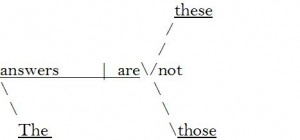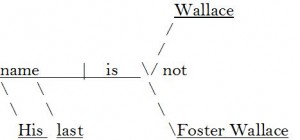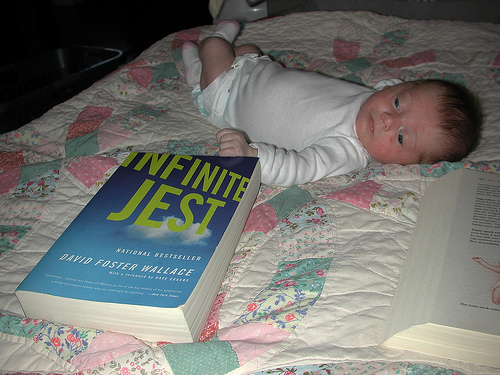A list of remembrances of writers who passed in the 00s, by other writers, including one of David Foster Wallace by George Saunders, plus JG Ballard, Susan Sontag, Grace Paley, W.G. Sebald, many others, at the Guardian.
20 Important Books in Other Languages; or, “a list always growing longer”

A post re:– neither repost nor riposte–Blake’s wichtige Liste and (only at first) about Infinite Jest in German. Maybe a chair is a good metaphor for who gets translated. Have you been translated? Have the Important Writers on Blake’s list? And not 25 because Saramago, Ouredník, and Zizek are already others, Ben Lerner’s a poet, Aase Berg’s both, and I’ll write about poets in translation and translation in poets at an other time.
Not sure if anyone went there during all the well DFW grammar talk (thanks, Amy), but imagine translating, say, Oblivion. Good that one of Wallace’s German translators, Ulrich Blumenbach, did just that, presumably (it first appeared in 2006), while whittling away at Infinite Jest, which took him six years and has had, as Unendlicher Spass (literally, the less Shakespearean Unending Fun), endless success: ten times the expected five grand copies have been sold since it appeared at the end of August, on the heels of Infinite Summer, which the publisher, KiWi, has translated too, as 100 Days of Infinite Jest (in German–it ended on 12-1).
In an interview with Der Spiegel, Blumenbach (pictured–in German) regrets that the author never answered his many questions, “a list always growing longer”: it seems Wallace had grown weary of taking translator’s queries, and, according to The Complete Review’s useful paraphrase of a slippery summary (still looking for the original source), considered the Spanish La broma infinita (tr. Calvo and Covian | Mondadori, 2002) and the Italian Infinite Jest (Nesi w/ Villoresi and Giua | Einaudi, 2006) and apparently other attempts (anyone know more?) to have “all failed, more or less.”
 In a warm war, France is responding with (900 pp. of) Vollmann’s Rising (not translated by the great Claro, see below, who did six previous tomes, but by one Jean-Paul Mourlon, translator, it seems, of Jimmy Carter and Hilary Clinton). There’s also German Vollmann (3 titles), Spanish Vollmann (3 more), Japanese Vollmann (2), Greek Vollmann (2), and Czech Vollmann, all (not counting the French) with only one title (Butterfly Stories) repeated.
In a warm war, France is responding with (900 pp. of) Vollmann’s Rising (not translated by the great Claro, see below, who did six previous tomes, but by one Jean-Paul Mourlon, translator, it seems, of Jimmy Carter and Hilary Clinton). There’s also German Vollmann (3 titles), Spanish Vollmann (3 more), Japanese Vollmann (2), Greek Vollmann (2), and Czech Vollmann, all (not counting the French) with only one title (Butterfly Stories) repeated.
American Genius is only a Great American Novel for now (does it even have a British publisher?), despite Tillman’s first book of stories, Tagebuch einer Masochisten, having appeared in Germany in 1986, four years before her first collection in English, READ MORE >
The New Yorker has an excerpt from David Foster Wallace’s The Pale King, ‘All That’. Feel kind of immensely scared to read.
Grammar Challenge: Reiterations of Some Explanations in the Now-Unwieldy Comments Section
First, thanks so much to all of you who read/took/RT’d/linked to/commented on the Dave Wallace grammar challenge. I wanted to pay a small, quiet tribute to someone who did a great lot for me, and I am floored by the response. I’m beginning to feel like a broken record in the comments sections, though, as they are increasingly hard to navigate, and many readers have taken similar but separate umbrage with the idea of teaching or testing Standard Written English in the first place. Wallace addresses this in the essay I linked to in the answers post, but as the comments keep rolling in, I want to summarize some of what he taught me about this issue.
So. The quiz was intended to help writing workshop students spot errors w/r/t the current conventions of Standard Written English (SWE). The point is NOT to teach students to lord little rules over their friends; the point is to be more careful writers. And why does knowing the current conventions of SWE help us become careful writers?
Probably the most important reason is to avoid ambiguity. We want to make our meaning clear. Putting modifiers far from what they modify creates extra work for the reader, so we learn to spot this trouble area. Professor Wallace distinguished between good, rich ambiguity (even in grammar–cf the brilliantly dangling modifiers of Barry Hannah) and bad, distracting ambiguity, where we cause our reader to wonder whether we’ve made a calculated nonstandard choice (which is fine as long as our readers can tell) or merely don’t know the current accepted standards are in usage in grammar. He wanted us to avoid the latter kind of ambiguity. READ MORE >
Grammar Challenge: Answers and Explanations

The answers to the other night’s grammar challenge appear haphazardly throughout that post’s comments section, but it seems like people are still taking it, so I thought I’d hide the answers here under the fold for ease of checking.
Here is the essay “Tense Present: Democracy, English, and the Wars over Usage” that Wallace published in Harper’s in 2001. Those of you who give knowing the rules a bad name by correcting other people’s spoken and casual English really need to read this. So do those of you who think fiction writers and poets don’t need to know the rules. Both groups are lazy. It’s lazy to learn some rule in elementary school and continue to lord it over people while failing to pay attention to shifts in usage. And it’s lazy to distract readers unnecessarily because you don’t realize that your misplaced adverb causes ambiguity. Every writer would do well to invest in a copy of Garner’s Modern American Usage. I took quite the browbeating from Wallace before I bought mine for putting “over all” (should be one word) in a story. And yes, the shakedown took place in Footnote 7 in his letter of critique.
But Wallace would recommend another, older essay–the one that inspired his own subtitle, George Orwell’s “Politics and the English Language.” Read that here.
Answers to worksheet, once you’re ready, are below. READ MORE >
Grammar Challenge!

Seemed like people enjoyed talking about the finer points of grammar and usage a month or so back, so I thought I’d provide a little morsel from a nonfiction workshop I took in college taught by someone who, among other accomplishments, was the most obsessively precise user of English I have ever and will ever encounter. I have, or, well, had, David Foster Wallace to thank for my own peevishness about mistakes in what he called S.W.E., or Standard Written English. So what follows is the complete text of a worksheet from his class. Whoever can come up with the most correct corrections will win something (currently taking prize suggestions/donations). I’ll post the answers once it seems as if nobody is trying anymore. Don’t worry if someone else posts their answers first; they may not be right! Not as easy as it may first look. All sentences have one crucial error in punctuation, usage, or grammar. Okay go! ANSWERS HERE when you’re ready. And HERE is an explanation of why he took the trouble to teach us these conventions.
183D
25 February 2004
IF NO ONE HAS YET TAUGHT YOU HOW TO AVOID OR REPAIR CLAUSES LIKE THE FOLLOWING, YOU SHOULD, IN MY OPINION, THINK SERIOUSLY ABOUT SUING SOMEBODY, PERHAPS AS CO-PLAINTIFF WITH WHOEVER’S PAID YOUR TUITION
1. He and I hardly see one another.
2. I’d cringe at the naked vulnerability of his sentences left wandering around without periods and the ambiguity of his uncrossed “t”s.
3. My brother called to find out if I was over the flu yet.
4. I only spent six weeks in Napa.
5. In my own mind, I can understand why its implications may be somewhat threatening.
6. From whence had his new faith come?
7. Please spare me your arguments of why all religions are unfounded and contrived.
8. She didn’t seem to ever stop talking.
9. As the relationship progressed, I found her facial tic more and more aggravating.
10. The Book of Mormon gives an account of Christ’s ministry to the Nephites, which allegedly took place soon after Christ’s resurrection.
The marketing and mythologizing comment thread on the Moya essay recalled, for me, David Foster Wallace’s remarkable 2004 review of a Borges biography. Wallace talks about the intentional fallacy and, if my reading is correct, indicts the practice of literary biography in general. (The connection to the Moya essay is oblique, but the review is worth reading on any terms.)
Editing INFINITE JEST
 Again, some bits from the Sonora Review DFW Tribute Issue, which I’m still reading through; this time I’ve excerpted Rick Moody’s interview of Michael Pietsch, who edited Infinite Jest while at Little, Brown. The whole interview is interesting, as Pietsch talks about how he acquired IJ, how he and Wallace worked together to edit it, and how ‘it felt as if [they’d] published a book that mattered, and that would last.’ Pietsch calls it ‘one of the great thrills’ of his working life.
Again, some bits from the Sonora Review DFW Tribute Issue, which I’m still reading through; this time I’ve excerpted Rick Moody’s interview of Michael Pietsch, who edited Infinite Jest while at Little, Brown. The whole interview is interesting, as Pietsch talks about how he acquired IJ, how he and Wallace worked together to edit it, and how ‘it felt as if [they’d] published a book that mattered, and that would last.’ Pietsch calls it ‘one of the great thrills’ of his working life.
Of the editing process, Pietsch says that ‘every decision was David’s. I made suggestions and recommendations and tried to make the reasons for them as clear as possible. But every change was his.’
After the jump, you’ll find some responses Wallace made to Pietsch’s requests for cuts.
What is a happy story?
 Last Tuesday afternoon, someone in my Introduction to Fiction class asked me if we would ever read a ‘happy’ story this semester, and I didn’t know how to answer. I didn’t feel comfortable saying ‘no’ or ‘yes,’ because I have a hard time understanding what is a happy story and what is a sad story. For those who don’t know, all of our readings have come from The Anchor Book of New American Short Stories, and we’re about to start reading My Happy Life by Lydia Millet for the novel portion of the course. I like to think that the kinds of things we’re reading are somewhat varied; however, another student disagreed, and criticized the selections Ben Marcus had made. The student pointed at what Marcus says in the introduction (“What I found in my reading was an amazing range of styles, beliefs, methods, ideologies, and instincts.”) and commented that despite the differences Marcus intended to show, the stories in the anthology, in the student’s opinion, are all generally sad and depressing. And if we categorize stories that way, and if we assume that we share the student’s definition of sad, then there isn’t much variety in that, right?
Last Tuesday afternoon, someone in my Introduction to Fiction class asked me if we would ever read a ‘happy’ story this semester, and I didn’t know how to answer. I didn’t feel comfortable saying ‘no’ or ‘yes,’ because I have a hard time understanding what is a happy story and what is a sad story. For those who don’t know, all of our readings have come from The Anchor Book of New American Short Stories, and we’re about to start reading My Happy Life by Lydia Millet for the novel portion of the course. I like to think that the kinds of things we’re reading are somewhat varied; however, another student disagreed, and criticized the selections Ben Marcus had made. The student pointed at what Marcus says in the introduction (“What I found in my reading was an amazing range of styles, beliefs, methods, ideologies, and instincts.”) and commented that despite the differences Marcus intended to show, the stories in the anthology, in the student’s opinion, are all generally sad and depressing. And if we categorize stories that way, and if we assume that we share the student’s definition of sad, then there isn’t much variety in that, right?
But, and this is my question, are there really happy stories and sad stories? If they exist, how do you define one or the other, or is it even a matter of one or the other?
n+1 remembers David Foster Wallace.
Nick Maniatis, master of The Howling Fantods, remembers David Foster Wallace at Infinite Summer.
